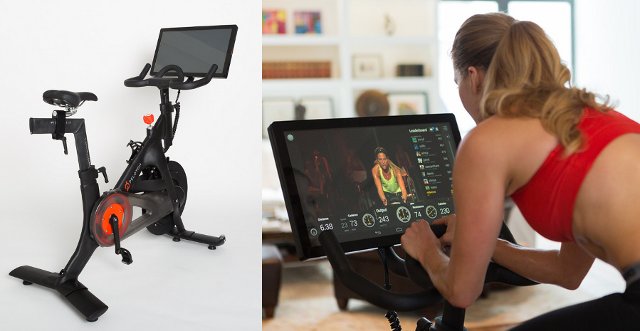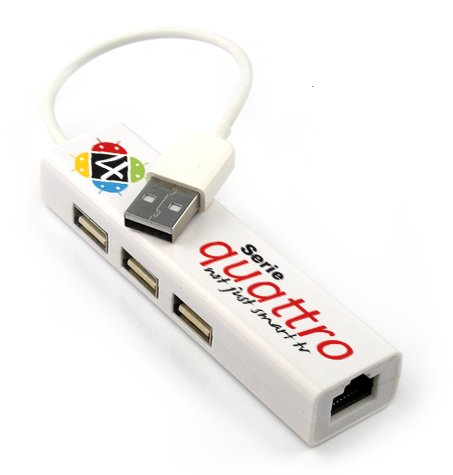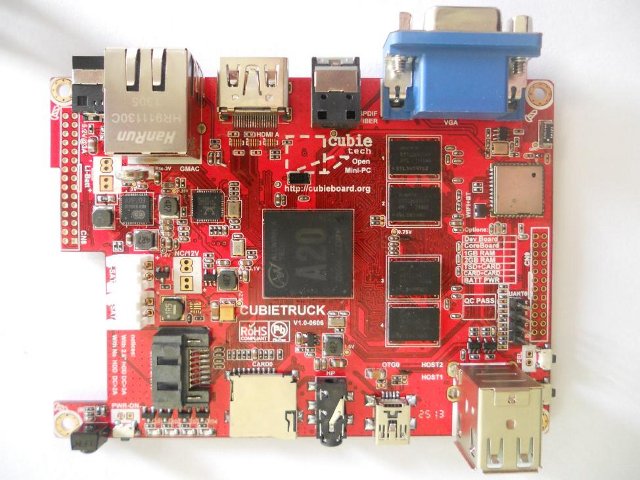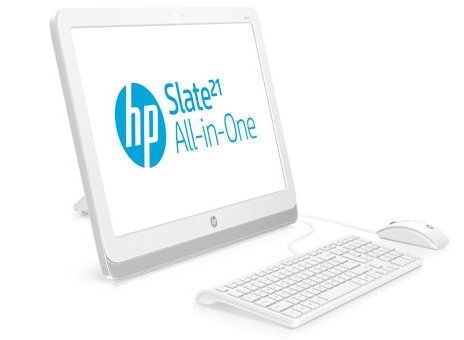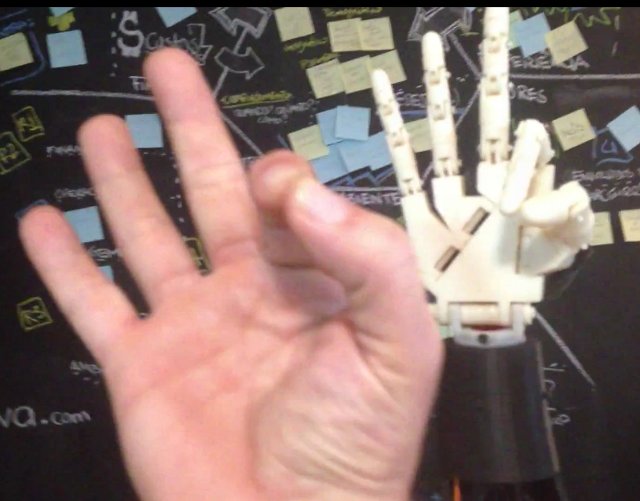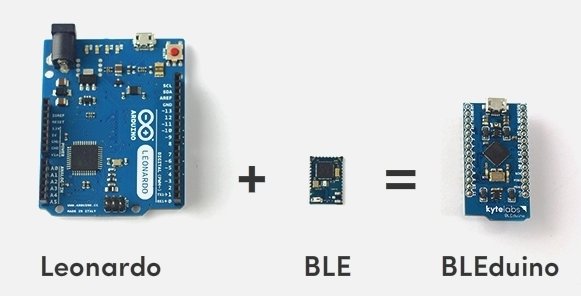Beyond smartphones and tablets, Android is now running in a number of others devices such as cars, watches, set-top boxes and more, but Android should soon enter the gym, or rather bring the gym to your home, with the Peloton Bike, an exercise bike that comes with a 21.5″ touchscreen powered by Texas Instruments OMAP4 and running Android 4.1. Here are Peloton bike panel’s specifications: SoC – Texax Instruments OMAP 4470 dual-core Cortex A9 @ 1.5GHz System Memory – 1GB RAM Storage – 16GB internal flash Display – 21.5″ PCAP (projected capacitive) multitouch display (1080p resolution). Sweat resistant. Connectivity: 802.11 b/g/n Wi-Fi ANT+ wireless Bluetooth 4.0 10/100 Ethernet Audio – 3.5mm TRRS headphone and mic jack, 2x 3 watt stereo speakers Camera – 1.3MP front camera Misc – Peloton Cycle data connector as well as the key features of the bike itself: Carbon steel and aluminum monocoque frame Neodymium rare […]
Ethernet & USB Hub Combo for Android Mini PCs
The first time I saw a USB & Ethernet hub was the one that comes with SmartCandy mini PC, but I never thought of checking if they sold such item separately until this morning, as I’ve noticed that Asiapads is selling a “Zero Devices Hub” with 3 USB 2.0 ports and a 10/100M Ethernet RJ45 connector. Of course, you could always get a standard USB hub plus an external Ethernet USB dongle, but an all-in-one solution maybe more convenient for some people. Zero Device Hub sells for $14.99, and is said to be compatible with Android mini PCs such as Z4C and Z2C. I’ve also looked on DealExtreme, and there’s one device with the same features for $11.90, but according to users’ reviews it’s not compatible with Android. The same device is also available for $7 and up on Aliexpress. The Ethernet part is apparently based on DM9601, which works in […]
Xiph Daala Codec Aims to Better H.265/HEVC Video Codec
H.265 (aka HEVC) video codec will eventually supplement H.264 over the years as it offers better compression at the same bitrate, or better quality for the same compression ratio. There’s a already some experimental implementation that allows to (slowly) decode and encode H.265 on your PC, as well as some HEVC implementations optimized for ARM SoCs. At least two other codecs aim to compete against, and better, HEVC: Google VP9, and Daala codec (temporary codename) developed by Xiph.org, the open source community that brought Vorbis or Theora open source codecs to the world. The Xiph developers explains that next generation codecs such as VP9 and HEVC are incremental improvement of codec designs using DCT (Discrete Cosine Transform) that have been used for years, and they’ve decided to take a new approach with lapped transforms, a technique that is also used in audio codecs such as MP3 and Vorbis. Lots of […]
Cubietruck Development Board Features AllWinner A20 SoC, 2GB RAM, and Gb Ethernet
When Cubietech announced the availability of the Cubieboard2 last week, some people seemed disappointed it only came with 1GB RAM and no Gigabit Ethernet. We already knew a board called Cubietruck was in the work with those features, but work has gone faster than I expected as pictures of the Cubietruck board are already available. Instead of simply listing the specifications, I’ll show a comparison table of the specifications against Cubieboard2. Cubietruck Cubieboard2 SoC AllWinner A20 Dual-Core ARM Cortex-A7 with Mali400 MP2 AllWinner A20 Dual-Core ARM Cortex-A7 with Mali400 MP2 System Memory 1GB or 2GB DDR3@480MHz 1GB DDR3@480MHz Storage SATA 2.0 interface + NAND + Micro SD slot (or 2x micro Sd slot) SATA 2.0 interface + 4GB NAND flash + micro SD slot, Video Output Connectors HDMI & VGA HDMI Audio I/O 1x TOSLINK (Optical SPDIF), 1x headphone jack 1x headphone jack, 1x line in Connectivity 10M/100M/1G Ethernet 10M/100M […]
HP Unveils Slate 21 AIO Android PC and Tablet with a 21.5″ Touchscreen
Hewlett Packard has announced an all-in-one desktop PC in Beijing featuring a 21.5″ touch screen that ships with Android 4.2.2 instead of the usual (for dekstop PCs) Windows 8 operating system. It’s a concept we’ve seen before with devices such as Frontier FT103, but HP Slate 21 AIO is much more powerful with Nvidia Tegra 4 quad core cortex A15 against the TI OMAP4 used in the Frontier PC. HP Slate 21 AIO (partial) specifications: SoC – Nvidia Tegra 4 quad core Cortex A15 processor System Memory – Unknown Storage – 8GB memory + SD card slot Display – 21.5″ 10-point capacitive touchscreen IPS display with 1920×1080 resolution Connectivity – Wi-Fi Direct and BT 3.0. Camera – Front-facing webcam USB – 3x USB 2.0 Host ports Audio – Stereo speakers, DTS audio. That’s all we know at this time, but since we can also connect a USB keyboard and mouse, […]
Open Source Prosthetic Arm Controlled By Muscle Movements
Gustavo Brancante is working on a very interesting project that let you control a prosthetic arm with your muscle movement using open source technology with InMoov Hand (which can be 3D printed), Arduino Uno R3, and Olimex Electrocardiography electromiography shield (SHIELD-EKG-EMG). This is called a Myo-Electric Prosthesis. Gabriel wrote a tutorial to use his “open arm” which I’ll summarize here. On the hardware front, you’ll also need a UDP compatible Wifi Shield configured as a UDP server with a fixed IP in the same LAN as the smartphone, and 57600 bps. TouchOSC (for smartphone and Workstation) is used with the following layout for calibration and feature selection. Finally load the program below to your Arduino board: Once everything is connected together, you should be able to do that: The demo looks impressive, but this is still work in progress, and next step will be to use a four channel EMG instead […]
$34 BLEduino Bluetooth 4.0 Low Energy Arduino-Compatible Board
After RFDuino, here’s another tiny low cost Bluetooth 4.0 SMART development board compatible with Arduino. BLEduino board is the merger of Arduino Leonardo and Bluetooth module, features Atmel ATmega32u4 MCU, Nordic Semi nRF8001 for BLE, and includes an on-board USB programming interface. Key features of BLEduino board: MCU – Atmel ATmega32u4 @ 16 MHz with 32 KB flash, 2.5 KB SRAM, and 1 KB EEPROM Power Supply – 5V. Onboard 5V & 3.3V regulators I/O: 21x GPIO Pins 6x PWM Channels 12x Analog Input Channels Serial Communication – UART, SPI, I2C LED – RX/TX for serial communication, LED for Bluetooth connectivity Bluetooth – Version 4.0 with Low Energy sypport via Nordic Semi nRF8001. Expected range: at least 24 meters Dimensions – Around 22.8 x 43.2 mm Kytelab, the company behind BLEduino, also provides “Shield-Shield”, a baseboard that translates BLEduino’s pin layout into the traditional Arduino layout, and allows you to […]
GEAK Watch is an Android 4.1 Smartwatch Packed with Features
Smartwatches have been available since 2011, in different formats, most of the time as a smartphone companion such as Pebble, or sometimes with slightly more powerful hardware running Android 2.3. one example being the I’m Watch. The GEAK Watch goes a step further for a relatively powerful Ingenic JZ4774 MIPS processor clocked at 1 GHz, Android Jelly Bean, WiFi 802.11b/g/n, Bluetooth 4.0, NFC…, and the ability to install apps directly from an app store. GEAK Watch hardware specifications: SoC- Ingenic JZ4774 processor @ 1GHz System Memory – 512MB RAM Storage – 4GB NAND Flash Display – 1.55″ LED capacitive touch screen (OGS) with 240 × 240 resolution Connectivity: WiFi 802.11 b/g/ n Bluetooth 4.0 NFC/GPS/FM Sensors – G-Sensor, Gyroscope, and Geomagnetic sensors Battery – 330mAh lithium polymer battery The watch is water-resistant (IP3X), enables heartbeat and blood pressure monitoring (maybe with external Bluetooth hardware), can be used as a pedometer, and […]


